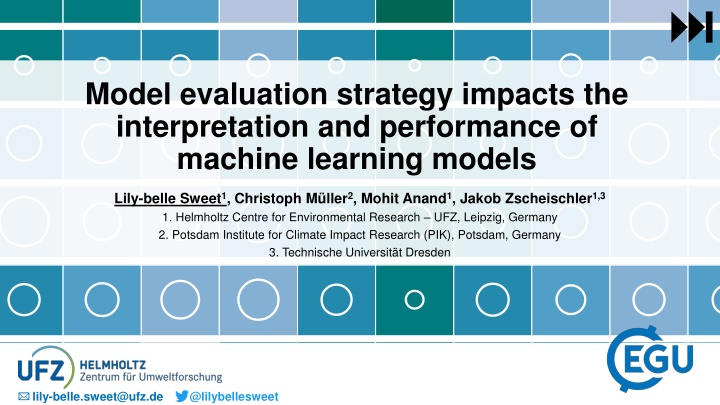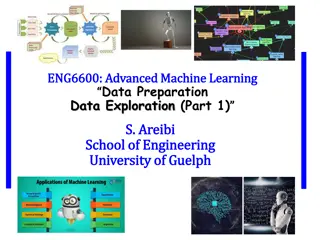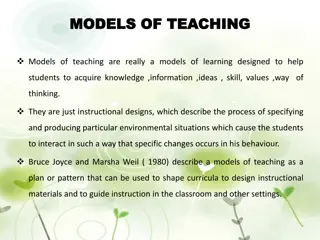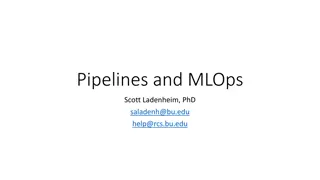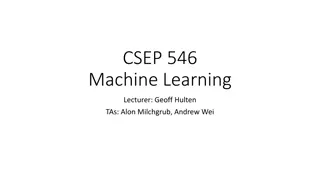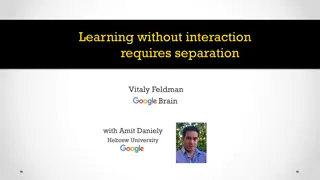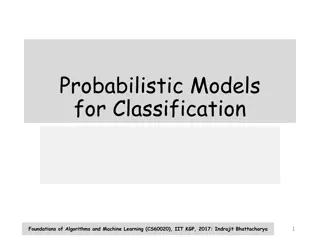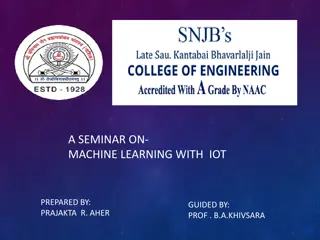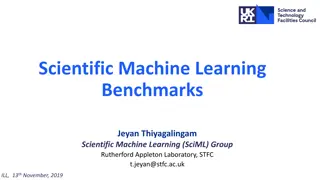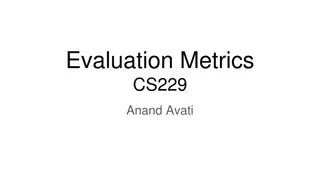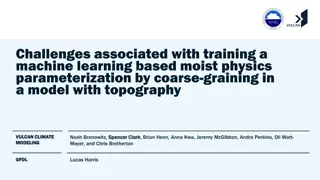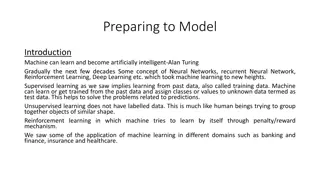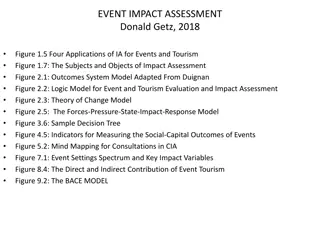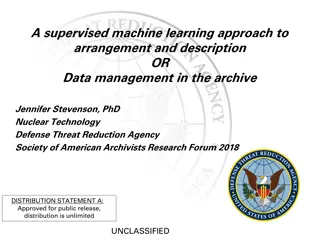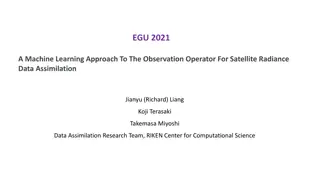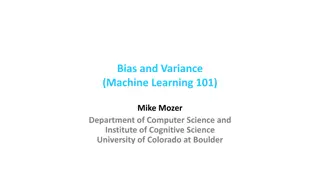Model evaluation strategy impacts the interpretation and performance of machine learning models
The evaluation strategy used for machine learning models significantly impacts their interpretation and performance. This study explores different evaluation methods and their implications for understanding climate-crop dynamics using explainable machine learning approaches. The strategy involves training models to emulate crop models, varying evaluation techniques, and measuring performance on unseen regions and years.
Download Presentation

Please find below an Image/Link to download the presentation.
The content on the website is provided AS IS for your information and personal use only. It may not be sold, licensed, or shared on other websites without obtaining consent from the author.If you encounter any issues during the download, it is possible that the publisher has removed the file from their server.
You are allowed to download the files provided on this website for personal or commercial use, subject to the condition that they are used lawfully. All files are the property of their respective owners.
The content on the website is provided AS IS for your information and personal use only. It may not be sold, licensed, or shared on other websites without obtaining consent from the author.
E N D
Presentation Transcript
Model evaluation strategy impacts the interpretation and performance of machine learning models Lily-belle Sweet1, Christoph M ller2, Mohit Anand1, Jakob Zscheischler1,3 1. Helmholtz Centre for Environmental Research UFZ, Leipzig, Germany 2. Potsdam Institute for Climate Impact Research (PIK), Potsdam, Germany 3. Technische Universit t Dresden lily-belle.sweet@ufz.de @lilybellesweet
Introduction Crop yields depend on climate conditions in complex, nonlinear ways. Machine learning models are able to capture these relationships. Explainable machine learning could be used to improve scientific understanding of climate-crop dynamics. Gunnar Lischeid et al. Agricultural and Forest Methodology. (2022) lily-belle.sweet@ufz.de @lilybellesweet
How should we evaluate spatiotemporal model performance? heldout years? random test set? heldout regions? or something else? lily-belle.sweet@ufz.de @lilybellesweet
Its a known issue: lily-belle.sweet@ufz.de @lilybellesweet
The impact on model interpretation is not yet clear. Gunnar Lischeid et al. Agricultural and Forest Methodology. (2022) Q. Liu et al. Agricultural Intelligence for the Earth Systems. (2022) lily-belle.sweet@ufz.de @lilybellesweet
Our strategy Train machine learning models to emulate a process- based crop model (LPJmL). Vary the model evaluation strategy used. Interpret models & measure model performance on unseen regions and/or years. lily-belle.sweet@ufz.de @lilybellesweet
Model evaluation strategy impacts the interpretation and performance of machine learning models Lily-belle Sweet1, Christoph M ller2, Mohit Anand1, Jakob Zscheischler1,3 1. Helmholtz Centre for Environmental Research UFZ, Leipzig, Germany 2. Potsdam Institute for Climate Impact Research (PIK), Potsdam, Germany 3. Technische Universit t Dresden lily-belle.sweet@ufz.de @lilybellesweet
Methodology Heldout regions Maize yields Climate variables Maize yield from LPJmL Covers 1948-2008 0.5 degree resolution No irrigation, fertilization etc Current cropping areas only Shift by sowing / planting dates; Calculate extreme indices Detrend by gridpoint; Mask current cropping areas Crop yield data 20-fold outer CV Test sets: Unseen years; Unseen regions; Unseen regions and years Training set 2 Global daily reanalysis data Covers 1948-2008 0.5 degree resolution Variables used: monthly average pr, tas, rsds Extreme indicators (WD, CD, FD, min temp, max temp, mean diurnal range, max five- day precipitation) Use 3 months before planting date plus the duration of growing season 1 20-fold inner CV Climate data Tune hyperparameters Select features Fit models (Random Forest) Evaluate models Interpret models lily-belle.sweet@ufz.de @lilybellesweet
Random k-fold overestimates model performance on unseen years or regions Temporal or feature-clustered cross-validation returns a more reasonable estimation. lily-belle.sweet@ufz.de @lilybellesweet Sweet et al. Artificial Intelligence for the Earth Systems(in review)
Cross-validation strategy impacts permutation feature importances lily-belle.sweet@ufz.de @lilybellesweet Sweet et al. Artificial Intelligence for the Earth Systems(in review)
Cross-validation strategy impacts permutation feature importances lily-belle.sweet@ufz.de @lilybellesweet Sweet et al. Artificial Intelligence for the Earth Systems(in review)
Cross-validation strategy impacts hyperparameters, feature selection Sweet et al. Artificial Intelligence for the Earth Systems(in review)
Cross-validation strategy impacts model performance on unseen years and/or regions Model skill is evaluated after hyperparameter-tuning and feature- selection is conducted using the selected (nested) cross-validation strategy. Use of feature-clusters CV improved model performance on unseen years and regions. lily-belle.sweet@ufz.de @lilybellesweet Sweet et al. Artificial Intelligence for the Earth Systems(in review)
The variation in feature importances across CV folds may reveal relationships between drivers. For example, by regressing the mean climatic conditions against the feature importance score in each test fold, we can identify the conditions in which a certain driver becomes relevant. lily-belle.sweet@ufz.de @lilybellesweet Sweet et al. Artificial Intelligence for the Earth Systems(in review)
Why does the use of feature-space clustered cross-validation return more plausible feature importances? lily-belle.sweet@ufz.de @lilybellesweet Sweet et al. Artificial Intelligence for the Earth Systems(in review)
Table of contents Title Hyperparameters & features Methodology Model performance Model evaluation Variation in importances Permutation importances 1 Correlation in permuted data Permutation importances 2
